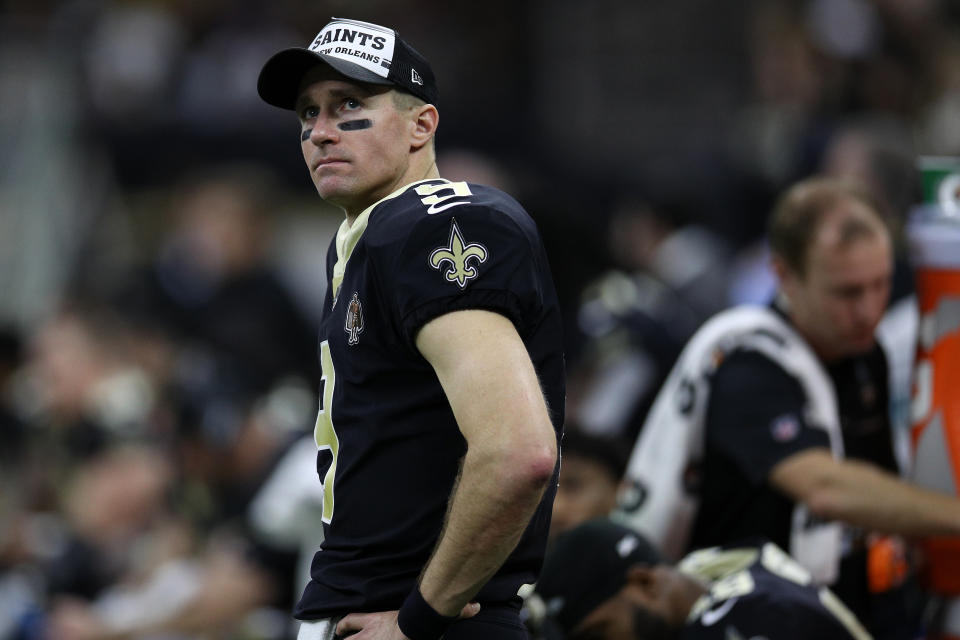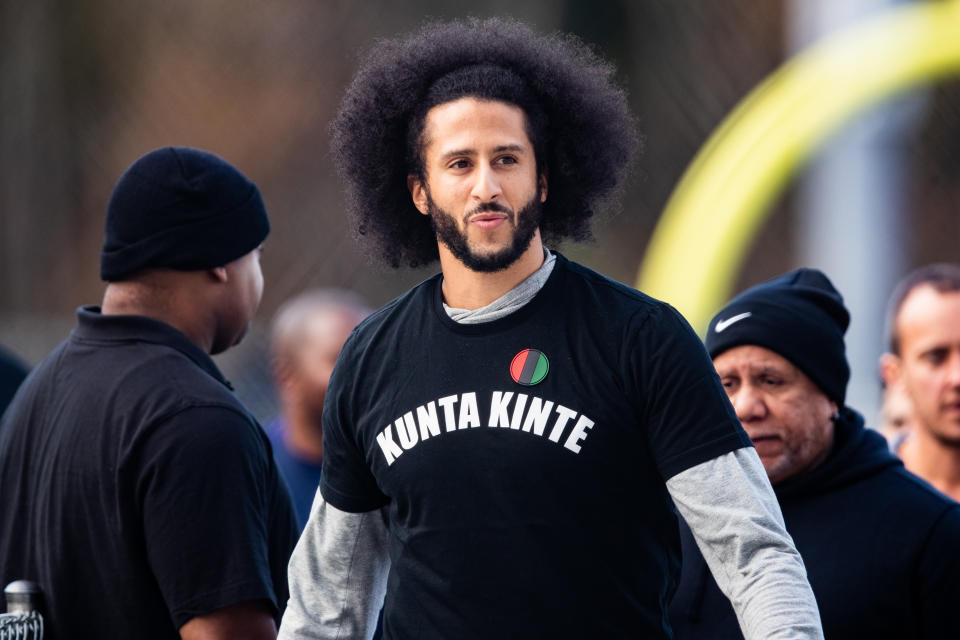After Drew Brees backlash, the NFL must finally figure out how to handle kneeling protests
On Wednesday, citing two grandfathers who fought in World War II, New Orleans quarterback Drew Brees said that even in wake of the death of African American George Floyd, an incident in which a former Minneapolis police officer is facing second-degree murder charges, he opposed any player kneeling during the pregame national anthem.
“I will never agree with anybody disrespecting the flag of the United States of America or our country,” Brees told Yahoo Finance’s Daniel Roberts.
He was immediately ripped by teammates, opponents, other athletes, entertainers and even plenty of fans. By Thursday, Brees apologized.
“In an attempt to talk about respect, unity, and solidarity centered around the American flag and the national anthem, I made comments that were insensitive and completely missed the mark on the issues we are facing right now as a country,” Brees wrote in a statement released on social media. “They lacked awareness and any type of compassion or empathy. Instead, those words have become divisive and hurtful and have misled people into believing that somehow I am an enemy.”
It’s the latest sign that while 2016 wasn’t that long ago ... it sure feels that way.
The NFL was caught flatfooted when Colin Kaepernick first took a knee to protest social injustice and police brutality. The league never found a coherent strategy to handle it, became an easy applause line for Donald Trump and lost fans in the fallout.
Now here comes the return of its worst (and most unresolved) nightmare. Only this time, with seemingly different rules of engagement.

What Brees said on Wednesday wasn’t much different than what he said in 2016.
“I wholeheartedly disagree [with the kneeling],” Brees told ESPN then. “... There’s plenty of other ways that you can [protest] in a peaceful manner that doesn’t involve being disrespectful to the American flag.”
A lot of players shared similar sentiments, including African American players. There was little to no backlash from their peers. It was rare for more than a few players of any color on a single team to take a knee.
That even included when, in 2017, Trump called any kneeling player a “son of a bitch” and elicited the most unified response. Even team owners, many of whom are donors and supporters of Trump, linked arms with players or briefly kneeled in a show of solidarity.
Yet in the first game played after those comments — a Jacksonville-Baltimore clash in London — just 14 Jaguars and about 10 Ravens took a knee. The reasons not to kneel were nuanced, personal and thoughtful.
Telvin Smith of the Jags said since the game was being played on foreign soil, it didn’t feel right. Teammate Marcedes Lewis said he struggled with it because his stepfather was in the military and earned a Purple Heart.
Everyone seemed to understand. Or at least no one was shouting them down.
Now?
Times change. Societies change. Generally, it’s the young who lead the way and the NFL is forever young. The average age of opening day rosters in 2019 ranged from to 25.2 (Miami) to 27 (New England). So many players in the 2020 season will have experienced Kaepernick, and the fallout from him, as college or even high school students.
Those who fight for social change are often extremely unpopular in the moment. New generations tend to bring sweeping change.
A 1966 Gallup poll found 63 percent of Americans had a negative opinion of Dr. Martin Luther King. By 1983, he joined George Washington as the only person to have a federal holiday celebrating his birth (and Washington’s is mostly referred to as “Presidents’ Day”). In 2011, Gallup found 94 percent of Americans viewed King positively.
History will almost assuredly side with Kaepernick. This is an early sign of that. Even young, white, franchise quarterbacks — generally the least likely to take political stands — have come out with forceful statements. Joe Burrow, Carson Wentz, Matt Ryan, Ryan Tannehill and so on have not just condemned Floyd’s murder but cited the need for wholesale change.

“For years, we have all been taught to ‘just stay out of politics [when one side is so far one way and the other side is far the other],’” wrote Las Vegas’ Derek Carr, equating standing up now to his tradition of being public with his faith. “I felt in my heart this was the right moment to speak up, to not care so much about politics but instead speak truth.”
What passed for reasonable disagreement within the team structure three or four years ago may not anymore. Kaepernick always maintained the protest has nothing to do with the military. The American flag, after all, represents the entire country and all its citizens, not just soldiers. Military branches have their own flags.
The response to Brees was both historically informative — noting that many African Americans fought for America only to return to discrimination — and a swift effort to not allow the topic to be marginalized as “anti-military.”
Brees quickly apologized. Is that the end? Will NFL locker rooms need to be unified or risk splintering? Will everyone need to agree, or at least not voice dissent? Will emotional, hash-it-out, sessions become part of training camp schedules?
Will kneeling protests, if they return, feature a majority of players, or even all of them? Will it be a white quarterback — who, unfortunately, can still have outsized influence compared to an African American teammate — that leads this time?
There are still a lot of fans out there who agree with Drew Brees. There is still Trump, heading into a presidential election season.
This is the new reality for an old situation that the NFL, from its central office to its owners suites to its individual meeting rooms, has to finally figure out how to navigate.
The league may have changed a lot in the last few years.
Has America?
More from Yahoo Sports:

 Yahoo Sports
Yahoo Sports 